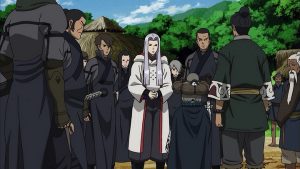 Motivationally speaking, I’m in a complicated place with this re-watch of Seirei no Moribito at the moment. With the current season being so bereft, I have little competing for my anime time. But I have a desire to stretch this out, because I know how close we are to the end now. I also instinctively recoil a bit at the emotional battering I know I’m going to take experiencing these last few episodes again. And if that weren’t enough, watching Moribito is very bittersweet because its greatness is a reminder of just how elusive greatness has become in anime. Not that greatness on this level was ever remotely common, but on any level it’s become more and more scarce lately.
Motivationally speaking, I’m in a complicated place with this re-watch of Seirei no Moribito at the moment. With the current season being so bereft, I have little competing for my anime time. But I have a desire to stretch this out, because I know how close we are to the end now. I also instinctively recoil a bit at the emotional battering I know I’m going to take experiencing these last few episodes again. And if that weren’t enough, watching Moribito is very bittersweet because its greatness is a reminder of just how elusive greatness has become in anime. Not that greatness on this level was ever remotely common, but on any level it’s become more and more scarce lately.
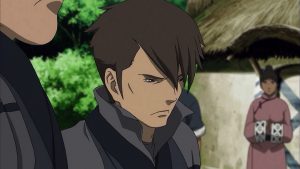 There’s not much that absolutely demands to be said about this ep above and beyond the fact that it’s 22 minutes of near-perfection. Every scene is like a little movie in its own right, each leading to the next. How to choose what stood out? It all begins with the standoff between Torogai and the Hunters – and Shuga, of course. Torogai is very much in her element here – there’s no scenario involving human interaction where she can’t assert her dominance. Still, this is tense – Torogai has to play a relatively weak hand as if she’s holding pocket aces. She can’t command, only convince – but she has to convince in a commanding way to have any chance of success.
There’s not much that absolutely demands to be said about this ep above and beyond the fact that it’s 22 minutes of near-perfection. Every scene is like a little movie in its own right, each leading to the next. How to choose what stood out? It all begins with the standoff between Torogai and the Hunters – and Shuga, of course. Torogai is very much in her element here – there’s no scenario involving human interaction where she can’t assert her dominance. Still, this is tense – Torogai has to play a relatively weak hand as if she’s holding pocket aces. She can’t command, only convince – but she has to convince in a commanding way to have any chance of success.
 Shuga is the key to this whole scenario in many ways. He’s the only one who can stay the hand of the Hunters, who may not be bloodthirsty or cruel but nevertheless clearly value Yakue lives as insignificant. But he’s also a receptive audience for Torogai. Shuga is a man of science, such as it exists in this time and place, and unstained by court politics like the “whelp” of an octogenarian Holy Sage Torogai looks down on. His priority is the safety of Chagum, which means he’s persuadable. Maybe surprisingly so – that’s a debatable point to be sure – but Torogai makes it abundantly clear the Yakue have a better idea of how to ensure the boy’s survival than he or Yogo’s ten thousand soldiers do.
Shuga is the key to this whole scenario in many ways. He’s the only one who can stay the hand of the Hunters, who may not be bloodthirsty or cruel but nevertheless clearly value Yakue lives as insignificant. But he’s also a receptive audience for Torogai. Shuga is a man of science, such as it exists in this time and place, and unstained by court politics like the “whelp” of an octogenarian Holy Sage Torogai looks down on. His priority is the safety of Chagum, which means he’s persuadable. Maybe surprisingly so – that’s a debatable point to be sure – but Torogai makes it abundantly clear the Yakue have a better idea of how to ensure the boy’s survival than he or Yogo’s ten thousand soldiers do.
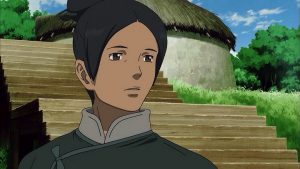 This is true, though still part of an audacious bluff by Torogai. Fortunately her poker face is unshakable and tragedy is averted – for the moment. Shuga is arrogant, but not a fool. Torogai knows more than he does, and Balsa is a stronger warrior than anyone on his side – these are facts he can stipulate to from personal experience. That makes her proposition reasonable, though if the Hunters had not been placed under Shuga’s command they would almost surely have defied his wishes here. Shuga defers – and not only that, he thanks Tanda (who’s surprised to even be remembered) for his role in leading Shuga to the truth. In this moment Shuga reveals there’s more to him than one might have assumed.
This is true, though still part of an audacious bluff by Torogai. Fortunately her poker face is unshakable and tragedy is averted – for the moment. Shuga is arrogant, but not a fool. Torogai knows more than he does, and Balsa is a stronger warrior than anyone on his side – these are facts he can stipulate to from personal experience. That makes her proposition reasonable, though if the Hunters had not been placed under Shuga’s command they would almost surely have defied his wishes here. Shuga defers – and not only that, he thanks Tanda (who’s surprised to even be remembered) for his role in leading Shuga to the truth. In this moment Shuga reveals there’s more to him than one might have assumed.
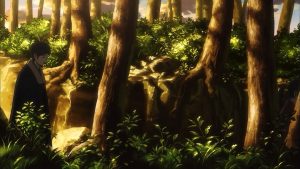 Of course in the larger scheme this is merely a small skirmish, and none of Chagum’s protectors have a clue about how to protect him when the moment of destiny arrives with spring. The quartet head off to Hunter’s Cave, one of my favorite locales in the series. This entire extended sequence is a mind-blowing symphony of gorgeous backgrounds and cinematography, and Kawai Kenji’s achingly beautiful music. It’s awe-inspiring in the best sense of the word – a reminder of how brilliant the people behind this production are. Even a small moment like the Toumi villagers gathering to bow to Chagum is a masterpiece of narrative poetry. Though well-intentioned their gesture is a stab in the heart, a reminder to the boy of the fate he never asked for.
Of course in the larger scheme this is merely a small skirmish, and none of Chagum’s protectors have a clue about how to protect him when the moment of destiny arrives with spring. The quartet head off to Hunter’s Cave, one of my favorite locales in the series. This entire extended sequence is a mind-blowing symphony of gorgeous backgrounds and cinematography, and Kawai Kenji’s achingly beautiful music. It’s awe-inspiring in the best sense of the word – a reminder of how brilliant the people behind this production are. Even a small moment like the Toumi villagers gathering to bow to Chagum is a masterpiece of narrative poetry. Though well-intentioned their gesture is a stab in the heart, a reminder to the boy of the fate he never asked for.
 Torogai and Tanda mostly watch – and mostly, what they watch is Chagum. Tanda’s eyes reveal his fundamental kindness and empathy, and Torogai’s her relentless intellectual curiosity. They both know that only Balsa can reach Chagum in the dark place he’s gone to, give him the strength he’ll need to face what’s coming. He cannot escape this fate, only face it head-on and try to survive. That he’s struggling with that is hardly surprising – anyone, much less a child, would. And not even Balsa can spare him from this knowledge – the best she can do is show him that he’s supported and loved, and that’s not the sort of thing that comes easily to her.
Torogai and Tanda mostly watch – and mostly, what they watch is Chagum. Tanda’s eyes reveal his fundamental kindness and empathy, and Torogai’s her relentless intellectual curiosity. They both know that only Balsa can reach Chagum in the dark place he’s gone to, give him the strength he’ll need to face what’s coming. He cannot escape this fate, only face it head-on and try to survive. That he’s struggling with that is hardly surprising – anyone, much less a child, would. And not even Balsa can spare him from this knowledge – the best she can do is show him that he’s supported and loved, and that’s not the sort of thing that comes easily to her.
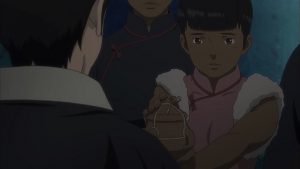 I don’t know how anyone could watch Balsa take Chagum’s chapped hands in her own and gingerly apply Tanda’s salve to them, much as Jiguro had done with her, and not be a little moved. These two warriors, hard and beaten-down and tasked with the emotional care of a child they never asked to care for, find it possible to express their feelings in this silent way when they cannot with words. The love borne of decency and shared experience which Jiguro shared with Balsa she now passes on to Chagum in the shadow of his grave. It’s beautiful in a very sad and profound way, as Seirei no Moribito so often is.
I don’t know how anyone could watch Balsa take Chagum’s chapped hands in her own and gingerly apply Tanda’s salve to them, much as Jiguro had done with her, and not be a little moved. These two warriors, hard and beaten-down and tasked with the emotional care of a child they never asked to care for, find it possible to express their feelings in this silent way when they cannot with words. The love borne of decency and shared experience which Jiguro shared with Balsa she now passes on to Chagum in the shadow of his grave. It’s beautiful in a very sad and profound way, as Seirei no Moribito so often is.


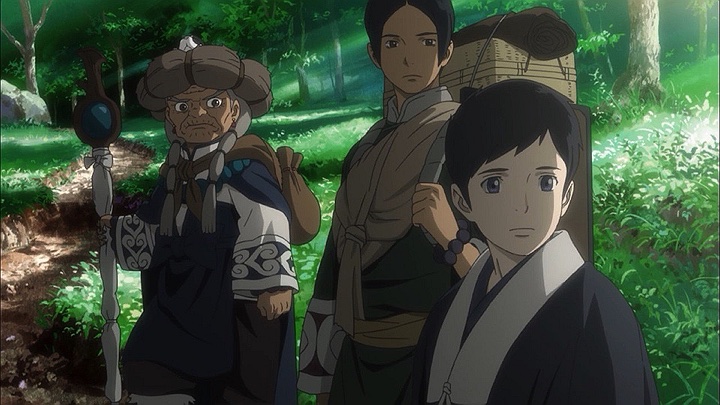
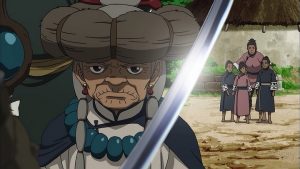
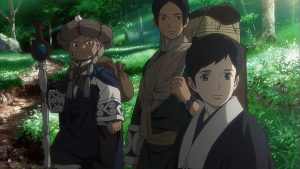
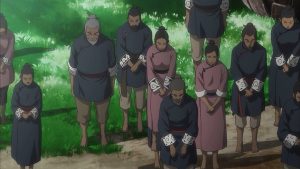

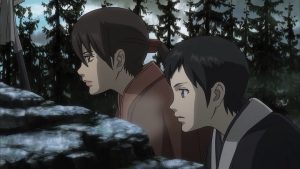
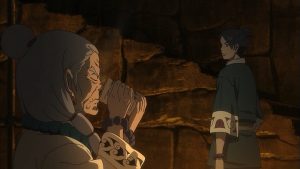
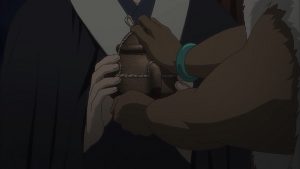

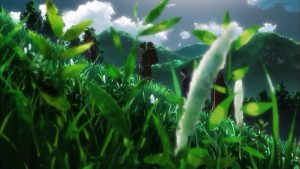
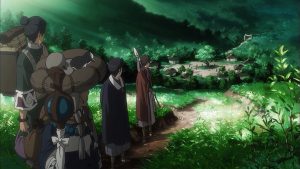
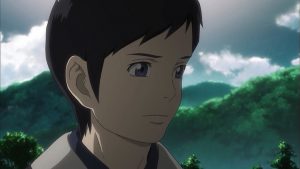
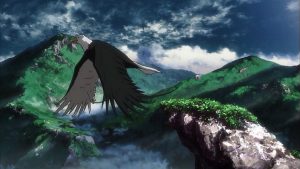
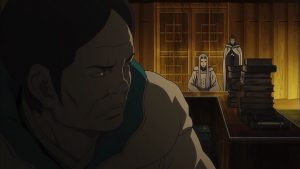


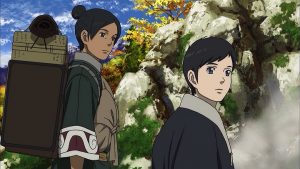
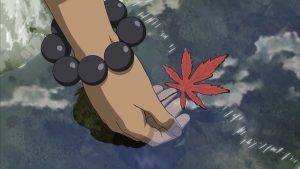
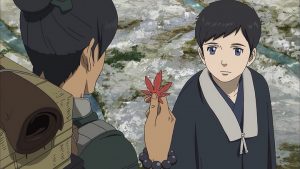

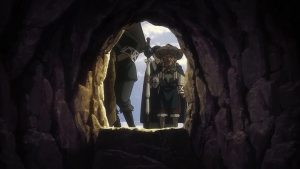
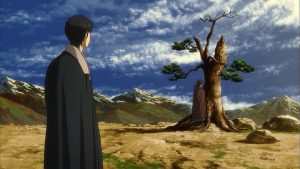
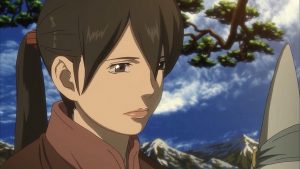
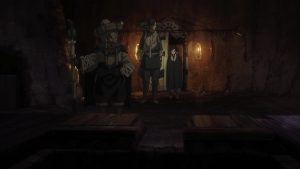
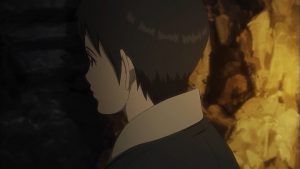

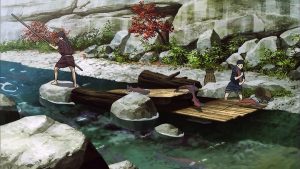

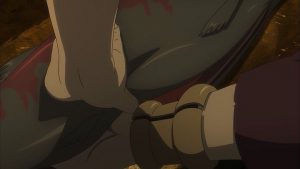
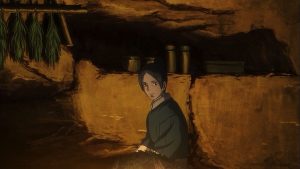
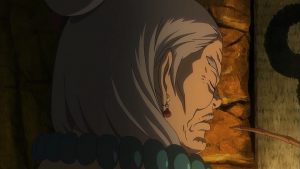

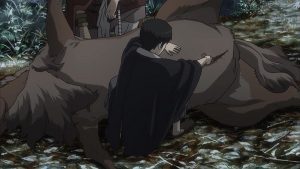
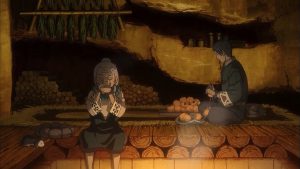
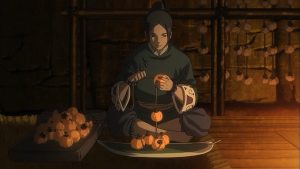
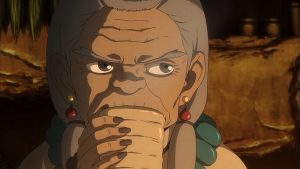
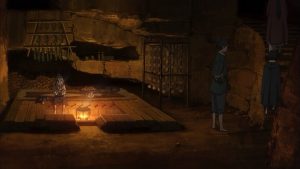
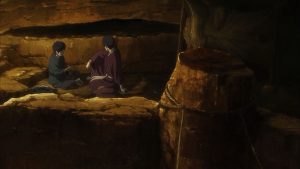
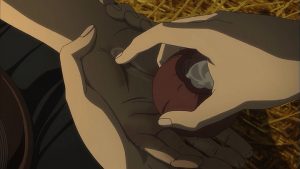
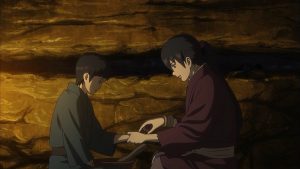
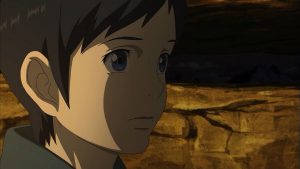
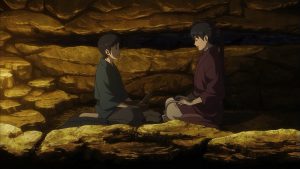
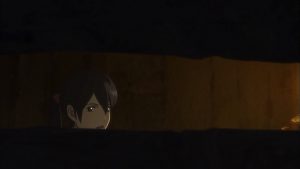
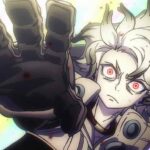
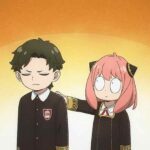
Panino Manino
July 19, 2020 at 9:17 amIs not that Shuga is man of science, is more that he is a man of peace. He may be part of the constitutes the power of the monarchy, but is not a violence part of that power, that’s way enforcing the will of the Palace doesn’t necessarily means using violence, and in doing so he is still working to achieve his goal, Chagum’s safety. The mission is still on going. It’s like destiny, change some people involved and all would end in tragedy.
Balsa’s story for example, that will help so much to make Chagum understand her and accept his fate, trust his life to her, every detail matter.
Guardian Enzo
July 19, 2020 at 10:17 amHe’s both.
Panino Manino
July 20, 2020 at 2:26 amYes, “both”.
Gakai for example is also a man of science and studies, but he isn’t Shuga. Wouldn’t work with him.
Guardian Enzo
July 20, 2020 at 7:37 amRemember Shuga said “meaningless bloodshed won’t solve anything”. I think meaningless is the key word here, because if Shuga believed that razing the village would guarantee Chagum’s survival, I have no doubt he’d order it done. He’s no pacifist by a long shot.
Remember, Shuga knows that for all their strength, the Hunters have been pwned in the field by not just Balsa but Torogai, too. The key component of his character in this situation is his ability to be rational and dispassionate enough to choose the practical course.
Raikou
July 20, 2020 at 7:20 amI finally caught up with the series.
This series is soo good, how can I miss it all these years.
Really loved how Torogai controlled the whole situation in the village.
I also loved the scene when Chagum was brought back by Balsa to the village. No words spoken, yet it got me soo much.
All the seiyuus are doing an amazing job. Shame Andou Mabuki isn’t taking more anime job.
And finally, Balsa Flashback next episode.
Guardian Enzo
July 20, 2020 at 7:38 amYes, that scene is lovely. So much conveyed without dialogue (though Kawai’s music does speak volumes).